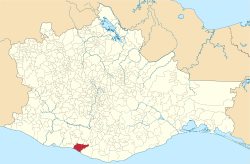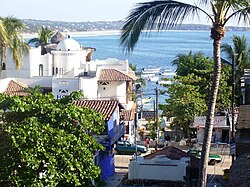San Pedro Mixtepec | |
|---|---|
Municipality and town | |
 Location of the municipality in Oaxaca | |
| Coordinates: 16°0′0″N97°7′1″W / 16.00000°N 97.11694°W | |
| Country | |
| State | Oaxaca |
| Area | |
• Total | 325.1 km2 (125.5 sq mi) |
| • Town | 2.34 km2 (0.90 sq mi) |
| Elevation | 220 m (720 ft) |
| Population (2020 census) [1] | |
• Total | 49,780 |
| • Density | 150/km2 (400/sq mi) |
| • Town | 5,103 |
| • Town density | 2,200/km2 (5,600/sq mi) |
| Time zone | UTC-6 (Central Standard Time) |
| • Summer (DST) | UTC-5 (Central Daylight Time) |
San Pedro Mixtepec is a town and municipality in Oaxaca in south-western Mexico. It is part of the Juquila District in the center of the Costa Region. [2]
Contents

